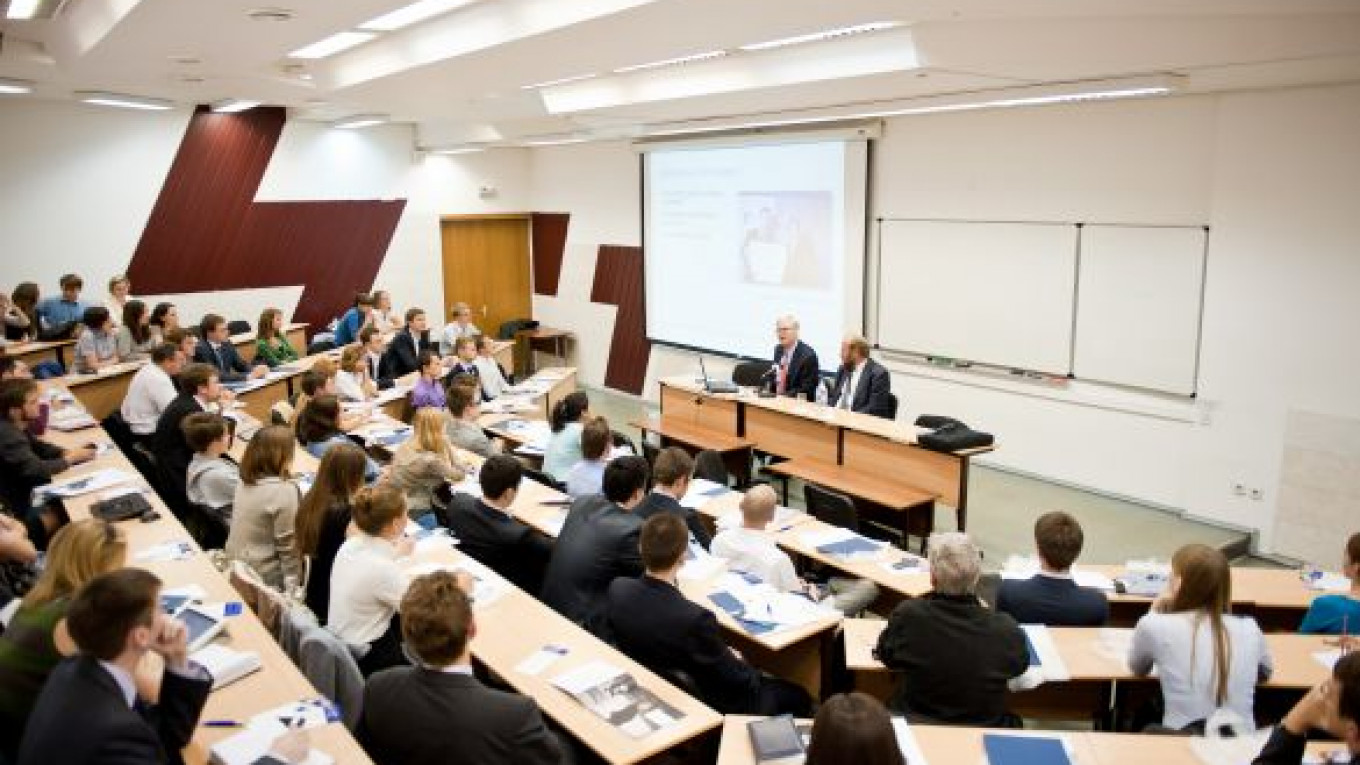While recruitment firms say an increasing number of vacancies is creating a demand bubble on the job market, there is one field with more than enough candidates for positions being offered: banking.
Many Western banks have been downsizing or ending operations in Russia, leaving their employees to seek positions elsewhere. Staffing agency Flex told The Moscow Times last week that it is seeing "a large influx of resumes in the banking sphere, especially active candidates working as analysts and traders." At recruitment firm Antal Russia, the number of candidates roughly matches the number of vacancies in banking, the firm said.
A disproportionately high ratio of graduates who majored in finance, as opposed to other fields, is also enlarging the pool of candidates.
Job-hunters need a way to stand out from the crowd and, in the field of banking and finance, the Chartered Financial Analyst (CFA) qualification provides an opportunity to do so. It requires passing three integral levels of examinations to become a full-fledged charterholder. Most who attempt each test fail.
"Russian employers are obsessed with qualifications, and this is one qualification they take very seriously," Luc Jones, a partner at Antal Russia and a board member of the Canadian Eurasia Russia Business Association, told The Moscow Times.
"The CFA is especially important for those who work with investments: analysts, financial advisers, and risk and portfolio managers," said Maria Safronova, a recruitment manager at Flex.
In October 2009, Moscow's Higher School of Economics signed a partnership agreement with the U.S.-based CFA Institute, beginning its training course for the qualification. This is currently the only certified CFA training course in Russia, according to the CFA Institute website. The lengthy program, including 200 hours of Saturday classes from October to May, coaches test-takers for the June exam.
But with a $4,700 price tag, the instruction doesn't come cheap. Consulting firm Ernst & Young offers a five-month course for about half that much. Many other uncertified programs cost far less. For the larger cost, the Higher School of Economics program offers a higher quality of preparation than its competitors, said Alexander Pushko, deputy director of the Higher School of Economics' Banking Institute, which administers the CFA program.
Each year more than 200,000 people around the world attempt a CFA exam, but only 100,000 have passed all three levels. Currently only 400 fully qualified charterholders live in Russia, according to the CFA Association Russia, the local charterholder society.
For its program, the Higher School of Economics assembled a team of charterholders "to convey not only the basic knowledge for the specified topics to future charterholders but also share their own personal experience in getting ready for the exams," Pushko said.
The program has changed little over the past three years, as its syllabus strictly conforms to the one prescribed by the CFA Institute, but an emphasis has been placed directly on exam preparation, Pushko said.
"We have begun to pay more attention not only to students mastering the content of the subjects taught but also to the acquisition of practical skills needed to pass the examination for a certificate," he said.
CFA-hopefuls who don't want to shell out thousands of dollars for tuition, however, can study on their own. With the Higher School of Economics only accepting 25 people into its core CFA program and an additional 25 into a private course just for Sberbank employees, self-study is a viable option.
Andrei Yekimenko, a corporate finance manager at PricewaterhouseCoopers, recently passed the third and final level of the CFA and is currently in the process of obtaining membership and getting a charter. He studied for the CFA on his own with Kaplan Schweser books, preparation materials that the Higher School of Economics also uses.
"Time pressure is the most challenging aspect. One needs to be very well prepared to cope with the tasks," Yekimenko told The Moscow Times. "Take a proper amount of time to study; learn how the formulas work, don't just memorize them; and train with online practice exams."
The CFA Institute promotes self-training, noting that many professionals pursue a CFA to complement a master's in business administration.
"The CFA curriculum is extremely well-structured, and some 70 percent of the material has been directly relevant to my job," Yekimenko said. "As initially I did not have an educational background in finance, passing CFA exams made me feel that I have obtained comprehensive knowledge required for my profession."
Yekimenko graduated from Moscow State University with a degree in public administration, and obtaining the CFA qualification was a way to prove to his employer his capabilities in the field of financial advisory, he said. Tatiana Bartiouk, a manager in banking and financial services at staffing firm Antal, also noted this trend.
"The CFA is a good way for candidates without a degree in finance or applied mathematics to prove themselves worthy of jobs in the banking sphere," she said. "It's one of the most prestigious qualifications in the field."
A Message from The Moscow Times:
Dear readers,
We are facing unprecedented challenges. Russia's Prosecutor General's Office has designated The Moscow Times as an "undesirable" organization, criminalizing our work and putting our staff at risk of prosecution. This follows our earlier unjust labeling as a "foreign agent."
These actions are direct attempts to silence independent journalism in Russia. The authorities claim our work "discredits the decisions of the Russian leadership." We see things differently: we strive to provide accurate, unbiased reporting on Russia.
We, the journalists of The Moscow Times, refuse to be silenced. But to continue our work, we need your help.
Your support, no matter how small, makes a world of difference. If you can, please support us monthly starting from just $2. It's quick to set up, and every contribution makes a significant impact.
By supporting The Moscow Times, you're defending open, independent journalism in the face of repression. Thank you for standing with us.
Remind me later.






